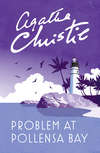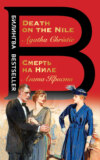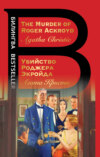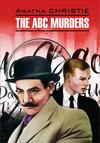Читать книгу: «Problem at Pollensa Bay»

Copyright
Published by HarperCollinsPublishers Ltd
1 London Bridge Street
London SE1 9GF
First published in Great Britain by HarperCollinsPublishers 1991
Agatha Christie® Problem at Pollensa Bay™
copyright © Agatha Christie Limited 1991. All rights reserved.
Cover by designedbydavid.co.uk © HarperCollins/Agatha Christie Ltd 2008
Agatha Christie asserts the moral right to be identified as the author of this work.
A catalogue copy of this book is available from the British Library.
This novel is entirely a work of fiction. The names, characters and incidents portrayed in it are the work of the author’s imagination. Any resemblance to actual persons, living or dead, events or localities is entirely coincidental.
All rights reserved under International and Pan-American Copyright Conventions. By payment of the required fees, you have been granted the non-exclusive, non-transferable right to access and read the text of this e-book on screen. No part of this text may be reproduced, transmitted, down-loaded, decompiled, reverse engineered, or stored in or introduced into any information storage and retrieval system, in any form or by any means, whether electronic or mechanical, now known or hereinafter invented, without the express written permission of HarperCollins.
Source ISBN: 9780008196455
Ebook Edition © December 2016 ISBN: 9780007422753
Version: 2017-09-13
Contents
Cover
Title Page
Copyright
1. Problem at Pollensa Bay
2. The Second Gong
3. Yellow Iris
4. The Harlequin Tea Set
5. The Regatta Mystery
6. The Love Detectives
7. Next to a Dog
8. Magnolia Blossom
Keep Reading …
Also by Agatha Christie
About the Publisher
Problem at Pollensa Bay
The steamer from Barcelona to Majorca landed Mr Parker Pyne at Palma in the early hours of the morning—and straightaway he met with disillusionment. The hotels were full! The best that could be done for him was an airless cupboard overlooking an inner court in a hotel in the centre of the town—and with that Mr Parker Pyne was not prepared to put up. The proprietor of the hotel was indifferent to his disappointment.
‘What will you?’ he observed with a shrug.
Palma was popular now! The exchange was favourable! Everyone—the English, the Americans—they all came to Majorca in the winter. The whole place was crowded. It was doubtful if the English gentleman would be able to get in anywhere—except perhaps at Formentor where the prices were so ruinous that even foreigners blenched at them.
Mr Parker Pyne partook of some coffee and a roll and went out to view the cathedral, but found himself in no mood for appreciating the beauties of architecture.
He next had a conference with a friendly taxi driver in inadequate French interlarded with native Spanish, and they discussed the merits and possibilities of Soller, Alcudia, Pollensa and Formentor—where there were fine hotels but very expensive.
Mr Parker Pyne was goaded to inquire how expensive.
They asked, said the taxi driver, an amount that it would be absurd and ridiculous to pay—was it not well known that the English came here because prices were cheap and reasonable?
Mr Parker Pyne said that that was quite so, but all the same what sums did they charge at Formentor?
A price incredible!
Perfectly—but WHAT PRICE EXACTLY?
The driver consented at last to reply in terms of figures.
Fresh from the exactions of hotels in Jerusalem and Egypt, the figure did not stagger Mr Parker Pyne unduly.
A bargain was struck, Mr Parker Pyne’s suitcases were loaded on the taxi in a somewhat haphazard manner, and they started off to drive round the island, trying cheaper hostelries en route but with the final objective of Formentor.
But they never reached that final abode of plutocracy, for after they had passed through the narrow streets of Pollensa and were following the curved line of the seashore, they came to the Hotel Pino d’Oro—a small hotel standing on the edge of the sea looking out over a view that in the misty haze of a fine morning had the exquisite vagueness of a Japanese print. At once Mr Parker Pyne knew that this, and this only, was what he was looking for. He stopped the taxi, passed through the painted gate with the hope that he would find a resting place.
The elderly couple to whom the hotel belonged knew no English or French. Nevertheless the matter was concluded satisfactorily. Mr Parker Pyne was allotted a room overlooking the sea, the suitcases were unloaded, the driver congratulated his passenger upon avoiding the monstrous exigencies of ‘these new hotels’, received his fare and departed with a cheerful Spanish salutation.
Mr Parker Pyne glanced at his watch and perceiving that it was, even now, but a quarter to ten, he went out onto the small terrace now bathed in a dazzling morning light and ordered, for the second time that morning, coffee and rolls.
There were four tables there, his own, one from which breakfast was being cleared away and two occupied ones. At the one nearest him sat a family of father and mother and two elderly daughters—Germans. Beyond them, at the corner of the terrace, sat what were clearly an English mother and son.
The woman was about fifty-five. She had grey hair of a pretty tone—was sensibly but not fashionably dressed in a tweed coat and skirt—and had that comfortable self-possession which marks an Englishwoman used to much travelling abroad.
The young man who sat opposite her might have been twenty-five and he too was typical of his class and age. He was neither good-looking nor plain, tall nor short. He was clearly on the best of terms with his mother—they made little jokes together—and he was assiduous in passing her things.
As they talked, her eye met that of Mr Parker Pyne. It passed over him with well-bred nonchalance, but he knew that he had been assimilated and labelled.
He had been recognized as English and doubtless, in due course, some pleasant non-committal remark would be addressed to him.
Mr Parker Pyne had no particular objection. His own countrymen and women abroad were inclined to bore him slightly, but he was quite willing to pass the time of day in an amiable manner. In a small hotel it caused constraint if one did not do so. This particular woman, he felt sure, had excellent ‘hotel manners’, as he put it.
The English boy rose from his seat, made some laughing remark and passed into the hotel. The woman took her letters and bag and settled herself in a chair facing the sea. She unfolded a copy of the Continental Daily Mail. Her back was to Mr Parker Pyne.
As he drank the last drop of his coffee, Mr Parker Pyne glanced in her direction, and instantly he stiffened. He was alarmed—alarmed for the peaceful continuance of his holiday! That back was horribly expressive. In his time he had classified many such backs. Its rigidity—the tenseness of its poise—without seeing her face he knew well enough that the eyes were bright with unshed tears—that the woman was keeping herself in hand by a rigid effort.
Moving warily, like a much-hunted animal, Mr Parker Pyne retreated into the hotel. Not half an hour before he had been invited to sign his name in the book lying on the desk. There it was—a neat signature—C. Parker Pyne, London.
A few lines above Mr Parker Pyne noticed the entries: Mrs R. Chester, Mr Basil Chester—Holm Park, Devon.
Seizing a pen, Mr Parker Pyne wrote rapidly over his signature. It now read (with difficulty) Christopher Pyne.
If Mrs R. Chester was unhappy in Pollensa Bay, it was not going to be made easy for her to consult Mr Parker Pyne.
Already it had been a source of abiding wonder to that gentleman that so many people he had come across abroad should know his name and have noted his advertisements. In England many thousands of people read the Times every day and could have answered quite truthfully that they had never heard such a name in their lives. Abroad, he reflected, they read their newspapers more thoroughly. No item, not even the advertisement columns, escaped them.
Already his holidays had been interrupted on several occasions. He had dealt with a whole series of problems from murder to attempted blackmail. He was determined in Majorca to have peace. He felt instinctively that a distressed mother might trouble that peace considerably.
Mr Parker Pyne settled down at the Pino d’Oro very happily. There was a larger hotel not far off, the Mariposa, where a good many English people stayed. There was also quite an artist colony living all round. You could walk along by the sea to the fishing village where there was a cocktail bar where people met—there were a few shops. It was all very peaceful and pleasant. Girls strolled about in trousers with brightly coloured handkerchiefs tied round the upper halves of their bodies. Young men in berets with rather long hair held forth in ‘Mac’s Bar’ on such subjects as plastic values and abstraction in art.
On the day after Mr Parker Pyne’s arrival, Mrs Chester made a few conventional remarks to him on the subject of the view and the likelihood of the weather keeping fine. She then chatted a little with the German lady about knitting, and had a few pleasant words about the sadness of the political situation with two Danish gentlemen who spent their time rising at dawn and walking for eleven hours.
Mr Parker Pyne found Basil Chester a most likeable young man. He called Mr Parker Pyne ‘sir’ and listened most politely to anything the older man said. Sometimes the three English people had coffee together after dinner in the evening. After the third day, Basil left the party after ten minutes or so and Mr Parker Pyne was left tête-à-tête with Mrs Chester.
They talked about flowers and the growing of them, of the lamentable state of the English pound and of how expensive France had become, and of the difficulty of getting good afternoon tea.
Every evening when her son departed, Mr Parker Pyne saw the quickly concealed tremor of her lips, but immediately she recovered and discoursed pleasantly on the above-mentioned subjects.
Little by little she began to talk of Basil—of how well he had done at school—‘he was in the First XI, you know’—of how everyone liked him, of how proud his father would have been of the boy had he lived, of how thankful she had been that Basil had never been ‘wild’. ‘Of course I always urge him to be with young people, but he really seems to prefer being with me.’
She said it with a kind of nice modest pleasure in the fact.
But for once Mr Parker Pyne did not make the usual tactful response he could usually achieve so easily. He said instead:
‘Oh! well, there seem to be plenty of young people here—not in the hotel, but round about.’
At that, he noticed, Mrs Chester stiffened. She said: Of course there were a lot of artists. Perhaps she was very old-fashioned—real art, of course, was different, but a lot of young people just made that sort of thing an excuse for lounging about and doing nothing—and the girls drank a lot too much.
On the following day Basil said to Mr Parker Pyne:
‘I’m awfully glad you turned up here, sir—especially for my mother’s sake. She likes having you to talk to in the evenings.’
‘What did you do when you were first here?’
‘As a matter of fact we used to play piquet.’
‘I see.’
‘Of course one gets rather tired of piquet. As a matter of fact I’ve got some friends here—frightfully cheery crowd. I don’t really think my mother approves of them—’ He laughed as though he felt this ought to be amusing. ‘The mater’s very old-fashioned … Even girls in trousers shock her!’
‘Quite so,’ said Mr Parker Pyne.
‘What I tell her is—one’s got to move with the times … The girls at home round us are frightfully dull …’
‘I see,’ said Mr Parker Pyne.
All this interested him well enough. He was a spectator of a miniature drama, but he was not called upon to take part in it.
And then the worst—from Mr Parker Pyne’s point of view—happened. A gushing lady of his acquaintance came to stay at the Mariposa. They met in the tea shop in the presence of Mrs Chester.
The newcomer screamed:
‘Why—if it isn’t Mr Parker Pyne—the one and only Mr Parker Pyne! And Adela Chester! Do you know each other? Oh, you do? You’re staying at the same hotel? He’s the one and only original wizard, Adela—the marvel of the century—all your troubles smoothed out while you wait! Didn’t you know? You must have heard about him? Haven’t you read his advertisements? “Are you in trouble? Consult Mr Parker Pyne.” There’s just nothing he can’t do. Husbands and wives flying at each other’s throats and he brings ’em together—if you’ve lost interest in life he gives you the most thrilling adventures. As I say the man’s just a wizard!’
It went on a good deal longer—Mr Parker Pyne at intervals making modest disclaimers. He disliked the look that Mrs Chester turned upon him. He disliked even more seeing her return along the beach in close confabulation with the garrulous singer of his praises.
The climax came quicker than he expected. That evening, after coffee, Mrs Chester said abruptly,
‘Will you come into the little salon, Mr Pyne? There is something I want to say to you.’
He could but bow and submit.
Mrs Chester’s self-control had been wearing thin—as the door of the little salon closed behind them, it snapped. She sat down and burst into tears.
‘My boy, Mr Parker Pyne. You must save him. We must save him. It’s breaking my heart!’
‘My dear lady, as a mere outsider—’
‘Nina Wycherley says you can do anything. She said I was to have the utmost confidence in you. She advised me to tell you everything—and that you’d put the whole thing right.’
Inwardly Mr Parker Pyne cursed the obtrusive Mrs Wycherley.
Resigning himself he said:
‘Well, let us thrash the matter out. A girl, I suppose?’
‘Did he tell you about her?’
‘Only indirectly.’
Words poured in a vehement stream from Mrs Chester. ‘The girl was dreadful. She drank, she swore—she wore no clothes to speak of. Her sister lived out here—was married to an artist—a Dutchman. The whole set was most undesirable. Half of them were living together without being married. Basil was completely changed. He had always been so quiet, so interested in serious subjects. He had thought at one time of taking up archaeology—’
‘Well, well,’ said Mr Parker Pyne. ‘Nature will have her revenge.’
‘What do you mean?’
‘It isn’t healthy for a young man to be interested in serious subjects. He ought to be making an idiot of himself over one girl after another.’
‘Please be serious, Mr Pyne.’
‘I’m perfectly serious. Is the young lady, by any chance, the one who had tea with you yesterday?’
He had noticed her—her grey flannel trousers—the scarlet handkerchief tied loosely around her breast—the vermilion mouth and the fact that she had chosen a cocktail in preference to tea.
‘You saw her? Terrible! Not the kind of girl Basil has ever admired.’
‘You haven’t given him much chance to admire a girl, have you?’
‘I?’
‘He’s been too fond of your company! Bad! However, I daresay he’ll get over this—if you don’t precipitate matters.’
‘You don’t understand. He wants to marry this girl—Betty Gregg—they’re engaged.’
‘It’s gone as far as that?’
‘Yes. Mr Parker Pyne, you must do something. You must get my boy out of this disastrous marriage! His whole life will be ruined.’
‘Nobody’s life can be ruined except by themselves.’
‘Basil’s will be,’ said Mrs Chester positively.
‘I’m not worrying about Basil.’
‘You’re not worrying about the girl?’
‘No, I’m worrying about you. You’ve been squandering your birthright.’
Mrs Chester looked at him, slightly taken aback.
‘What are the years from twenty to forty? Fettered and bound by personal and emotional relationships. That’s bound to be. That’s living. But later there’s a new stage. You can think, observe life, discover something about other people and the truth about yourself. Life becomes real—significant. You see it as a whole. Not just one scene—the scene you, as an actor, are playing. No man or woman is actually himself (or herself ) till after forty-five. That’s when individuality has a chance.’
Mrs Chester said:
‘I’ve been wrapped up in Basil. He’s been everything to me.’
‘Well, he shouldn’t have been. That’s what you’re paying for now. Love him as much as you like—but you’re Adela Chester, remember, a person—not just Basil’s mother.’
‘It will break my heart if Basil’s life is ruined,’ said Basil’s mother.
He looked at the delicate lines of her face, the wistful droop of her mouth. She was, somehow, a lovable woman. He did not want her to be hurt. He said:
‘I’ll see what I can do.’
He found Basil Chester only too ready to talk, eager to urge his point of view.
‘This business is being just hellish. Mother’s hopeless—prejudiced, narrow-minded. If only she’d let herself, she’d see how fine Betty is.’
‘And Betty?’
He sighed.
‘Betty’s being damned difficult! If she’d just conform a bit—I mean leave off the lipstick for a day—it might make all the difference. She seems to go out of her way to be—well—modern—when Mother’s about.’
Mr Parker Pyne smiled.
‘Betty and Mother are two of the dearest people in the world, I should have thought they would have taken to each other like hot cakes.’
‘You have a lot to learn, young man,’ said Mr Parker Pyne.
‘I wish you’d come along and see Betty and have a good talk about it all.’
Mr Parker Pyne accepted the invitation readily.
Betty and her sister and her husband lived in a small dilapidated villa a little way back from the sea. Their life was of a refreshing simplicity. Their furniture comprised three chairs, a table and beds. There was a cupboard in the wall that held the bare requirements of cups and plates. Hans was an excitable young man with wild blond hair that stood up all over his head. He spoke very odd English with incredible rapidity, walking up and down as he did so. Stella, his wife, was small and fair. Betty Gregg had red hair and freckles and a mischievous eye. She was, he noticed, not nearly so made-up as she had been the previous day at the Pino d’Oro.
She gave him a cocktail and said with a twinkle:
‘You’re in on the big bust-up?’
Mr Parker Pyne nodded.
‘And whose side are you on, big boy? The young lovers—or the disapproving dame?’
‘May I ask you a question?’
‘Certainly.’
‘Have you been very tactful over all this?’
‘Not at all,’ said Miss Gregg frankly. ‘But the old cat put my back up.’ (She glanced round to make sure that Basil was out of earshot) ‘That woman just makes me feel mad. She’s kept Basil tied to her apron strings all these years—that sort of thing makes a man look a fool. Basil isn’t a fool really. Then she’s so terribly pukka sahib.’
‘That’s not really such a bad thing. It’s merely “unfashionable” just at present.’
Betty Gregg gave a sudden twinkle.
‘You mean it’s like putting Chippendale chairs in the attic in Victorian days? Later you get them down again and say, “Aren’t they marvellous?”’
‘Something of the kind.’
Betty Gregg considered.
‘Perhaps you’re right. I’ll be honest. It was Basil who put my back up—being so anxious about what impression I’d make on his mother. It drove me to extremes. Even now I believe he might give me up—if his mother worked on him good and hard.’
‘He might,’ said Mr Parker Pyne. ‘If she went about it the right way.’
‘Are you going to tell her the right way? She won’t think of it herself, you know. She’ll just go on disapproving and that won’t do the trick. But if you prompted her—’
She bit her lip—raised frank blue eyes to his.
‘I’ve heard about you, Mr Parker Pyne. You’re supposed to know something about human nature. Do you think Basil and I could make a go of it—or not?’
‘I should like an answer to three questions.’
‘Suitability test? All right, go ahead.’
‘Do you sleep with your window open or shut?’
‘Open. I like lots of air.’
‘Do you and Basil enjoy the same kind of food?’
‘Yes.’
‘Do you like going to bed early or late?’
‘Really, under the rose, early. At half past ten I yawn—and I secretly feel rather hearty in the mornings—but of course I daren’t admit it.’
‘You ought to suit each other very well,’ said Mr Parker Pyne.
‘Rather a superficial test.’
‘Not at all. I have known seven marriages at least, entirely wrecked, because the husband liked sitting up till midnight and the wife fell asleep at half past nine and vice versa.’
‘It’s a pity,’ said Betty, ‘that everybody can’t be happy. Basil and I, and his mother giving us her blessing.’
Mr Parker Pyne coughed.
‘I think,’ he said, ‘that that could possibly be managed.’
She looked at him doubtfully.
‘Now I wonder,’ she said, ‘if you’re double-crossing me?’
Mr Parker Pyne’s face told nothing.
To Mrs Chester he was soothing, but vague. An engagement was not marriage. He himself was going to Soller for a week. He suggested that her line of action should be non-committal. Let her appear to acquiesce.
He spent a very enjoyable week at Soller.
On his return he found that a totally unexpected development had arisen.
As he entered the Pino d’Oro the first thing he saw was Mrs Chester and Betty Gregg having tea together. Basil was not there. Mrs Chester looked haggard. Betty, too, was looking off colour. She was hardly made-up at all, and her eyelids looked as though she had been crying.
They greeted him in a friendly fashion, but neither of them mentioned Basil.
Suddenly he heard the girl beside him draw in her breath sharply as though something had hurt her. Mr Parker Pyne turned his head.
Basil Chester was coming up the steps from the sea front. With him was a girl so exotically beautiful that it quite took your breath away. She was dark and her figure was marvellous. No one could fail to notice the fact since she wore nothing but a single garment of pale blue crêpe. She was heavily made-up with ochre powder and an orange scarlet mouth—but the unguents only displayed her remarkable beauty in a more pronounced fashion. As for young Basil, he seemed unable to take his eyes from her face.
‘You’re very late, Basil,’ said his mother. ‘You were to have taken Betty to Mac’s.’
‘My fault,’ drawled the beautiful unknown. ‘We just drifted.’ She turned to Basil. ‘Angel—get me something with a kick in it!’
She tossed off her shoe and stretched out her manicured toenails which were done emerald green to match her fingernails.
She paid no attention to the two women, but she leaned a little towards Mr Parker Pyne.
‘Terrible island this,’ she said. ‘I was just dying with boredom before I met Basil. He is rather a pet!’
‘Mr Parker Pyne—Miss Ramona,’ said Mrs Chester.
The girl acknowledged the introduction with a lazy smile.
‘I guess I’ll call you Parker almost at once,’ she murmured. ‘My name’s Dolores.’
Basil returned with the drinks. Miss Ramona divided her conversation (what there was of it—it was mostly glances) between Basil and Mr Parker Pyne. Of the two women she took no notice whatever. Betty attempted once or twice to join in the conversation but the other girl merely stared at her and yawned.
Suddenly Dolores rose.
‘Guess I’ll be going along now. I’m at the other hotel. Anyone coming to see me home?’
Basil sprang up.
‘I’ll come with you.’
Mrs Chester said: ‘Basil, my dear—’
‘I’ll be back presently, Mother.’
‘Isn’t he the mother’s boy?’ Miss Ramona asked of the world at large. ‘Just toots round after her, don’t you?’
Basil flushed and looked awkward. Miss Ramona gave a nod in Mrs Chester’s direction, a dazzling smile to Mr Parker Pyne and she and Basil moved off together.
After they had gone there was rather an awkward silence. Mr Parker Pyne did not like to speak first. Betty Gregg was twisting her fingers and looking out to sea. Mrs Chester looked flushed and angry.
Betty said: ‘Well, what do you think of our new acquisition in Pollensa Bay?’ Her voice was not quite steady.
Mr Parker Pyne said cautiously:
‘A little—er—exotic.’
‘Exotic?’ Betty gave a short bitter laugh.
Mrs Chester said: ‘She’s terrible—terrible. Basil must be quite mad.’
Betty said sharply: ‘Basil’s all right.’
‘Her toenails,’ said Mrs Chester with a shiver of nausea.
Betty rose suddenly.
‘I think, Mrs Chester, I’ll go home and not stay to dinner after all.’
‘Oh, my dear—Basil will be so disappointed.’
‘Will he?’ asked Betty with a short laugh. ‘Anyway, I think I will. I’ve got rather a headache.’
She smiled at them both and went off. Mrs Chester turned to Mr Parker Pyne.
‘I wish we had never come to this place—never!’
Mr Parker Pyne shook his head sadly.
‘You shouldn’t have gone away,’ said Mrs Chester. ‘If you’d been here this wouldn’t have happened.’
Mr Parker Pyne was stung to respond.
‘My dear lady, I can assure you that when it comes to a question of a beautiful young woman, I should have no influence over your son whatever. He—er—seems to be of a very susceptible nature.’
‘He never used to be,’ said Mrs Chester tearfully.
‘Well,’ said Mr Parker Pyne with an attempt at cheerfulness, ‘this new attraction seems to have broken the back of his infatuation for Miss Gregg. That must be some satisfaction to you.’
‘I don’t know what you mean,’ said Mrs Chester. ‘Betty is a dear child and devoted to Basil. She is behaving extremely well over this. I think my boy must be mad.’
Mr Parker Pyne received this startling change of face without wincing. He had met inconsistency in women before. He said mildly:
‘Not exactly mad—just bewitched.’
‘The creature’s a Dago. She’s impossible.’
‘But extremely good-looking.’
Mrs Chester snorted.
Basil ran up the steps from the sea front.
‘Hullo, Mater, here I am. Where’s Betty?’
‘Betty’s gone home with a headache. I don’t wonder.’
‘Sulking, you mean.’
‘I consider, Basil, that you are being extremely unkind to Betty.’
‘For God’s sake, Mother, don’t jaw. If Betty is going to make this fuss every time I speak to another girl a nice sort of life we’ll lead together.’
‘You are engaged.’
‘Oh, we’re engaged all right. That doesn’t mean that we’re not going to have any friends of our own. Nowadays people have to lead their own lives and try to cut out jealousy.’
He paused.
‘Look here, if Betty isn’t going to dine with us—I think I’ll go back to the Mariposa. They did ask me to dine …’
‘Oh, Basil—’
The boy gave her an exasperated look, then ran off down the steps.
Mrs Chester looked eloquently at Mr Parker Pyne.
‘You see,’ she said.
He saw.
Matters came to a head a couple of days later. Betty and Basil were to have gone for a long walk, taking a picnic lunch with them. Betty arrived at the Pino d’Oro to find that Basil had forgotten the plan and gone over to Formentor for the day with Dolores Ramona’s party.
Beyond a tightening of the lips the girl made no sign. Presently, however, she got up and stood in front of Mrs Chester (the two women were alone on the terrace).
‘It’s quite all right,’ she said. ‘It doesn’t matter. But I think—all the same—that we’d better call the whole thing off.’
She slipped from her finger the signet ring that Basil had given her—he would buy the real engagement ring later.
‘Will you give him back this, Mrs Chester? And tell him it’s all right—not to worry …’
‘Betty dear, don’t! He does love you—really.’
‘It looks like it, doesn’t it?’ said the girl with a short laugh. ‘No—I’ve got some pride. Tell him everything’s all right and that I—I wish him luck.’
When Basil returned at sunset he was greeted by a storm.
He flushed a little at the sight of his ring.
‘So that’s how she feels, is it? Well, I daresay it’s the best thing.’
‘Basil!’
‘Well, frankly, Mother, we don’t seem to have been hitting it off lately.’
‘Whose fault was that?’
‘I don’t see that it was mine particularly. Jealousy’s beastly and I really don’t see why you should get all worked up about it. You begged me yourself not to marry Betty.’
‘That was before I knew her. Basil—my dear—you’re not thinking of marrying this other creature.’
Basil Chester said soberly:
‘I’d marry her like a shot if she’d have me—but I’m afraid she won’t.’
Cold chills went down Mrs Chester’s spine. She sought and found Mr Parker Pyne, placidly reading a book in a sheltered corner.
‘You must do something! You must do something! My boy’s life will be ruined.’
Mr Parker Pyne was getting a little tired of Basil Chester’s life being ruined.
‘What can I do?’
‘Go and see this terrible creature. If necessary buy her off.’
‘That may come very expensive.’
‘I don’t care.’
‘It seems a pity. Still there are, possibly, other ways.’
She looked a question. He shook his head.
‘I’ll make no promises—but I’ll see what I can do. I have handled that kind before. By the way, not a word to Basil—that would be fatal.’
‘Of course not.’
Mr Parker Pyne returned from the Mariposa at midnight. Mrs Chester was sitting up for him.






















